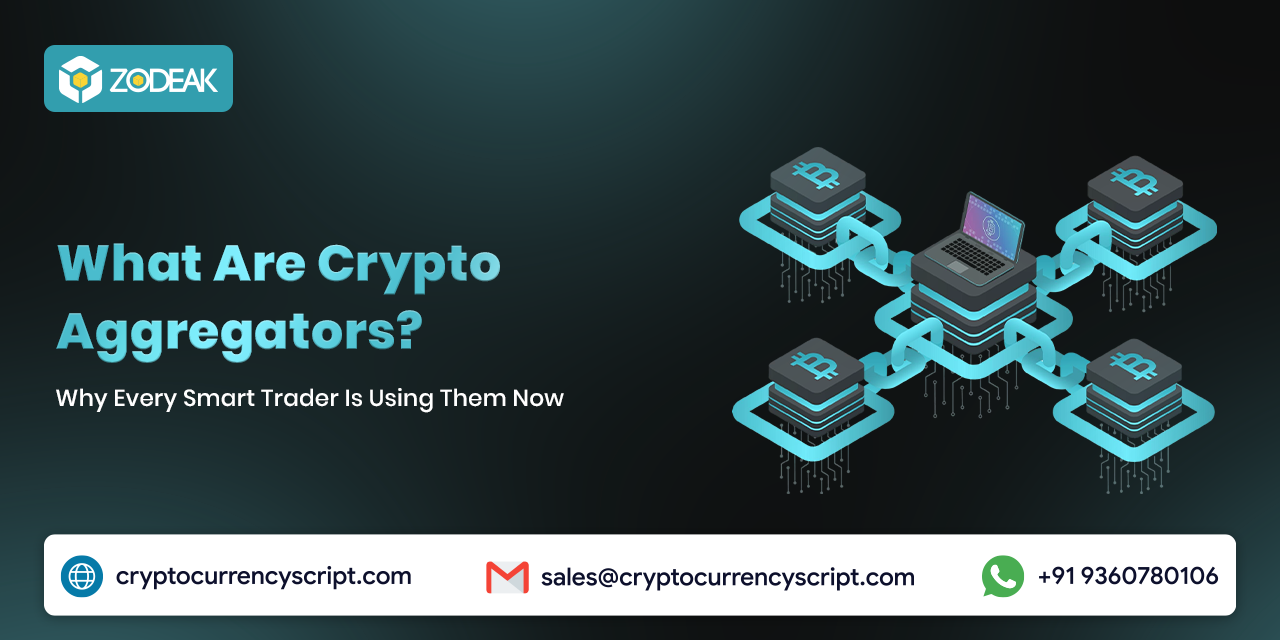Hey traders! Did you know that crypto data aggregators like CoinGecko and Kaiko track tens of thousands of coins across well over a thousand exchanges? Not sure what all that means, or what crypto aggregators are? It’s time to learn.
Just a quick heads-up: if you’re looking for better deals across decentralized platforms without constantly switching tabs, you’ll want to know this.
Spoiler alert: crypto aggregators are what’ll help you stop all that hopping. They are here to save you time and make your trading more efficient.
By the end of this blog, you’ll understand what crypto aggregators are, why traders use them, their types, and which ones are worth watching.
We’re ready whenever you are. Let’s go!
What Are Crypto Aggregators? Here’s How They Work
Crypto aggregators are platforms that collect and present real-time data from different cryptocurrency exchanges in one location. This way, you can quickly discover the best crypto deal.
Think of crypto aggregators like how you use Amazon. Say, you want to buy a cordless vacuum online; you don’t have to go to multiple stores to compare prices for the same item. Find every option conveniently in one place. This helps you score the best bargains without browsing different platforms.
There are actually 3 types of aggregators: DEX, yield, and data, all of which we’ll explore in detail later in the blog.
Note: CEX aggregators do exist, but DEXs are the main focus. Due to their fragmented liquidity, aggregation becomes important for getting the best prices and smooth trades. (while this is much less of a concern in CEXs)
What Makes Crypto Aggregators a Favorite Among Traders
Say you’re trading in a decentralized environment, jumping from one platform to another in search of the best token price.
Each exchange shows a slightly different rate, and you end up wasting both time and gas fees trying to compare.
That’s where a crypto aggregator comes in, because it offers:
#1. No Chase, Just Great Deals
The era of switching platforms is over. With aggregators scanning all options simultaneously, you can relax and stop searching. They search multiple DEXs to secure the best rate, even splitting your trade across several platforms if required.
Once you confirm, the aggregator executes the trade directly via smart contracts. You automatically get the best prices.
#2. Funds From Everywhere, Just A Tap Away
One exchange may lack depth. Another could come with a high cost. Aggregators gather liquidity from various chains and DEXs, ensuring that your trades are smoothly executed, even for larger deals.
#3. Less Work, More Results
You can finally stop juggling between different platform tabs and wallets. You now have access to a streamlined view for trading that specifies where to trade and how to trade, ultimately saving you time.
In the crypto arena, where time is indeed money, this one-stop view helps you explore DeFi without feeling overwhelmed.
#4. Hunting Better Returns, The Smart Way
Some aggregators go beyond just offering trading services. They automatically allocate your funds to the most profitable protocols, reinvest your gains, reduce fees, and mitigate risk.
You can earn income even while you sleep, as your capital works to find returns for you.
What Are the Main Crypto Aggregator Types?
Okay, now that you know “what are crypto aggregators” and the three main types, let’s go into a little more detail.
#1. DEX Aggregator
They search through multiple decentralized exchanges and route your trade toward the optimal path.
It’s like using a GPS that finds the fastest route to your destination.
#2. Yield Aggregator
They automate where your crypto gets to work. They chase the highest yields and reinvest automatically.
#3. Data Aggregator
These collect market data like price, volume, and rate, helping you quickly spot trends.
Crypto Aggregators in 2025: Key Changes You Should Know
- Cross-Chain Arbitrage Gains Traction
In the big ‘25, crypto lives across multiple chains like Ethereum, Solana, and Polygon. With aggregators simplifying the transfer of assets across their fragmented ecosystems, you can access cross-chain trades in your regular trading activity.
- Optimizing Trade Performance in High-Volatility Markets
In the fast-moving crypto market, aggregators use smart technology to find the best prices for trades across many places, which is very important when prices change quickly.
- Boosting Liquidity for a Bigger Market
As there are more crypto assets and users in 2025, aggregators help bring together different pools of money to create bigger, easier-to-trade markets. This helps both big investors and regular people use crypto more.
List of Leading Crypto Aggregators to Monitor
So, after going through the details about crypto aggregators along with their types and the benefits they provide, you must be excited to check out some examples. Here they are:
- Crypto Price Feeds & Market Movements
- If you’re looking for token prices, market caps, and volume data, CoinGecko and CoinMarketCap are your go-to sites.
- For in-depth institutional-grade research and analytics that go beyond simple price data, check out Messari.
- DEX Aggregators
- For solving the liquidity fragmentation issue across DEX, you might want to use 1inch, Matcha, Paraswap, and OpenOcean. They scan different DEX exchanges and split orders to find the best prices and execution routes.
- Personal Crypto Tracker
- If you want to link your wallet and keep tabs on all your assets, like tokens, NFTs, and DeFi positions across different blockchains, check out Zerion, Zapper, or Debank. They provide a complete overview of your crypto portfolio in one place.
- Market News & Research
- For curating the crypto news and seeing how it might affect the market from different web sources, CryptoPanic is a great option.
- When it comes to combining classic financial metrics like revenue, fees, and protocol income with blockchain analytics, Token Terminal is a solid option. It provides way deeper insights for investors.
Bonus Info: All of these platforms usually come with free and paid options, so choose what works for your crypto hustle.
Key Risks to Be Aware of When Using Crypto Aggregators
As crypto aggregators keep shining, just remember they aren’t without their flaws. A few things worth paying attention to:
- Support That Doesn’t Ghost You
Don’t overlook checking if they cover your go-to chain and tools.
- Friendly & Intuitive Controls
If the platform is loaded with flashy buttons and you’re unsure what they do, it’s definitely time to move on.
- Feedback Can Save You from Trouble
If you’re feeling lost about these platforms, it’s smart to shine some light by looking into what genuine users think about fees, reliability, and security.
- Know If It Matches Your Trading Style
For just swapping tokens, a DEX aggregator is all you need. But when it comes to yield farming and cross-chain activities, you should definitely look for a more advanced tool.
- Look for Strong Security, Not Just Promises
Ensure that the aggregator has completed audits and has protections against exploits and hacks.
- Watch Out for Hidden Charges
Keep an eye on fees and speed so you don’t get stuck or hurt your wallet.
Conclusion: Understanding What Crypto Aggregators Are Is Just The Beginning!
Now that you’ve unlocked the “What are crypto aggregators?” quest, you know how these amazing tools can make trading easier, increase efficiency, and lead to smarter investment choices.
Your next mission awaits.
Whether you’re a seasoned trader or just starting, using the right aggregator tech can change the game for your portfolio.
Curious how these innovations can simplify your trades or even help you earn while you sleep? Zodeak has your back.
We’re passionate about turning ideas into projects that make crypto rewarding. Want experts to help build your vision? You know where to find us.
Found this helpful? Share it with your friends and network!





